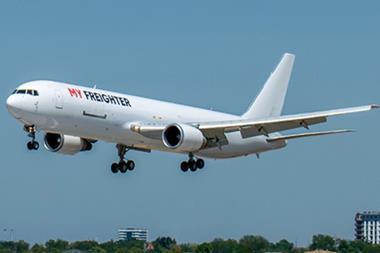The air cargo industry should take more responsibility and drive improvements in India’s supply chain operations rather than wait for major changes in infrastructure and bureaucracy.
During the Air Cargo India event, a panel of speakers outlined what quick-win changes could be made to improve air cargo supply chains in India.
Saudia Cargo vice president commercial Rainer Mueller said he felt that the air cargo industry should try to do more itself to improve some of the problems it faces in India, for instance flying to more than one airport on international freighter flights, to improve the service and reduce costs.
“I think there is a lot that we can do better to improve performance and make the exporters more successful and reduce cost for importers,” he said.
“For example, why aren’t we as the airlines able to do more double-drops? Why are we just operating one stop? Why aren’t we offering something that allows shippers to transport goods from Hyderabad to Mumbai in a few hours? We could do it. It is something that is in our hands.”
It was pointed out that on domestic cargo, this might require ninth freedom rights, which would be difficult to gain government approval for.
However, Mueller said it would also be useful for international cargo.
Another area for improvement mentioned by the panel was the lengthy processing time for cargo, sometimes up to seven days.
While this was partly down to Customs, forwarders were also taking time to clear cargo.
“Why are we accepting that those who are clearing the cargo are leaving it two or three days in the warehouse?” said Mueller.
“Why aren’t we sitting with the forwarders and our customers and letting them know it isn’t good? It is something that is in our hands so why aren’t we doing it?
“We have to drive the general issues, but there is also a lot that can be done and influenced by each of us."
Lufthansa Cargo board member responsible for product and sales Alexis von Hoensbroech identified three areas for improvement: bureaucracy, infrastructure and digitisation.
He would like to see an increase in the number of cool chain facilities available to help the pharma industry in India grow and also would like road infrastructure around airports improved.
A reduction of bureaucracy within companies was another area of improvement, he said.
“Bureaucracy means that things take far too long on the paper level and it’s definitely an area where quick wins can be made,” he said.
“It’s not just air cargo, the processing of paperwork is just a waste of time. Of course it needs to be done but it is something where everyone in the value chain can contribute to speed up the process.
“Digitalisation is an area where India, with such a bright population, can make a real difference. It’s a way to speed up all the paperwork.
“It’s ridiculous how much paper we have: for one shipment there are sometimes up to 35 documents.”
Ground handler Celebi Aviation vice president global marketing and sales Athina Kapeni added that she would like to see more collaboration among the air cargo industry in India.
For instance, she said, international airlines should form partnerships with domestic carriers to move cargo around the country, rather than try to obtain ninth freedom rights.
Another suggestion was to offer incentives to those who were slowing down the supply chain. She suggested offering forwarders incentives to encourage them to speed up cargo processing as an example.
Others also mentioned airports offering airlines incentives to start up domestic freighter services.
Finally, Air Charter Service chief executive Justin Bowman would like to see a reduction in the time it takes to obtain charter flight permissions.
“In India if you are lucky you can get permission to operate a charter flight in about three days and to do that takes about 35-40 telephone calls to try and get it pushed through all the bureaucracy of the system,” he said.
He suggested having five or six hub airports where the government makes it a standard operating procedure that permission is granted within 24 hours.
“We’re not looking to move from three days to a couple of hours but make it easy so shippers with their time-critical and high-value products they want to move on charter flights,” he said.










